新概念课堂笔记第一册Lesson9-10.pdf
新概念英语第一册 Lesson9-10 How are you today?
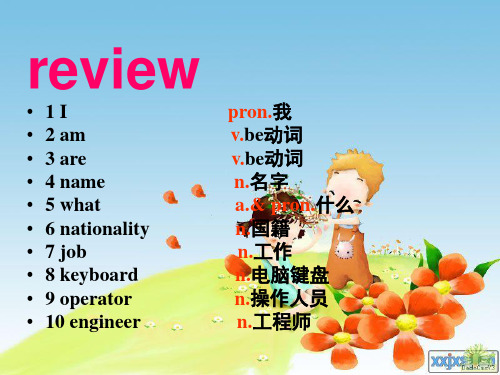
review
• • • • • • • • • • 1 policeman 2 policewoman 3 taxi driver 4 air hostess 5 postman 6 nurse 7 mechanic 8 hairdresser 9 housewife 10 milkman n.警察 n.女警察 出租汽车司机 空中小姐 n.邮递员 n.护士 n.机械师 n.理发师 n.家庭妇女 n.送牛奶的人
cold [kəuld] 冷的
hot dog 热狗
I’m very hot. 我很热。 I’m very cold. 我很冷。 It is very hot. 天很热。 It’s very cold. 天很冷。
young [jʌŋ] 年轻的
old [əuld] 年老的,旧的
new [nju:] 新的
1.用于朋友或相识的人之间的寒暄话
本课知识点
代词
代词的定义:
代词是一种能代 替名词、形容词 或数词的词。
代词分类
Which kind of pronouns is it?
人称代词 (Personal Pronouns) 物主代词 (Possessive Pronoun) 反身代词 (Reflexive Pronouns) 指示代词 (Demonstrative Pronouns)
review
• 1.What's your name? • What's his/her name? • 回答:My/His/Her name is.... • 2.What nationality are you? • 回答:I'm+国籍 • 3.What's your job? • 回答:Iபைடு நூலகம்m+职业
新概念英语第一册9-10课课件 ppt课件
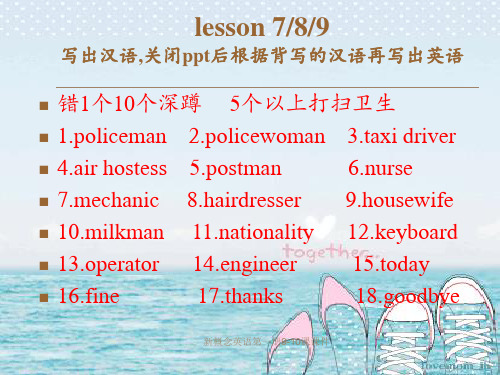
二、Greetings.问候练习
Hello ! Hi ! Good morning !
Good afternoon ! Good evening !
How are you ? How do you do !
Nice to meet you ! Glad to meet you !
• look (at) v.看……(强调动作)
• look at the blackboard
• look out of the window
• look into my eyes
• watch
v. 盯着看(强调连续性)
watch TV
• read
v. 看书性质,看报(强调阅读)
read books/ newspaper
代词
代词的定义:
代词是一种能代 替名词、形容词 或数词的词。
新概念英语第一册9-10课课件
代词分类 Which kind of pronouns is it?
人称代词 (Personal Pronouns) 物主代词 (Possessive Pronoun) 反身代词 (Reflexive Pronouns) 指示代词 (Demonstrative Pronouns) 疑问代词 (Interrogative Pronouns) 相互代词 (Reciprocal Pronouns) 不定代词 (Indefinite Pronouns)
新概念英语第一册910课课件lesson789写出汉语关闭ppt后根据背写的汉语再写出英语?错1个10个深蹲5个以上打扫卫生?1policeman2policewoman3taxidriver?4airhostess5postman6nurse?7mechanic8hairdresser9housewife?10milkman11nationality12keyboard?13operator14engineer15today?16fine17thanks18goodbye新概念英语第一册910课课件lesson9howareyoutoday
新概念英语第一册9-10课知识讲解
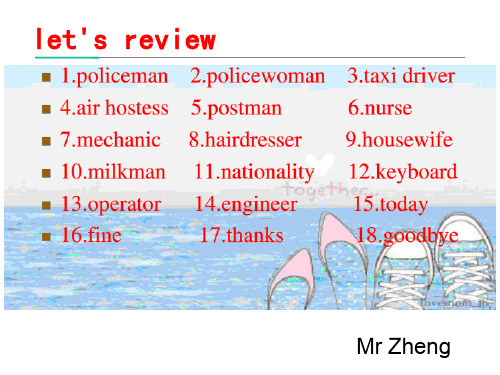
= See you later.=See you. =See you around.
S: H_e_l_l_o,Helen. H:__H_i_, Steven. S: _H_o_w_ _a_r_e__ _y_ou__ t_o_d_a_y_? H: I’m very _w_e_ll_, thank you. _An_d__ y_o_u__? S: I’m _w_e_l_l_,thanks. _H_o_w is Tony ? H: He’s fine, thanks. How’s Emma? S: She’s very well, __t_o_o, Helen.
G_o_o_db_y_e_, Helen. Nice to see you. H: Nice to see you ,too, Steven.
Goodbye.
特殊疑问词
who( 谁), where(哪里), which(哪一个),what(什么) when(是么时间), whose(谁的) why(为什么)how(如何,怎么样)
怎样 今天 身体好 美好的 再见 看见,见到
New words
h_o w t_o day w_e ll f_i ne g_o _o db_y e s_e _e
怎样 今天 身体好 美好的 再见 见
Listening and answer
How is Emma? She’s very well.
:
be 的用法口诀
我用am,你用are,is连着他,她,它; 单数名词用is,复数名词全用are. 变疑问,be要句首提,句末问号莫丢弃 变否定,更容易,be后not莫忘记 疑问否定任你变,句首大写莫迟疑
新概念第一册Lesson 9~10 笔记详解
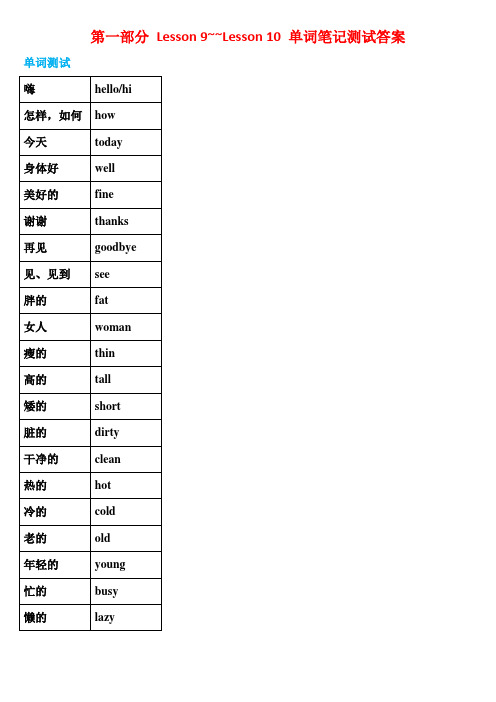
第一部分Lesson 9~~Lesson 10 单词笔记测试答案单词测试词组句型测试1. —你好吗? (熟人见面询问身体状况)How are you?—回答(2种):I am fine./I am well.下面的回答是比较地道的回答方式,但不符合语法规则:(要求读熟)积极的回答方式(好):Pretty good./I am doing good./I’m great./I am wonderful.相当好/我很好/我好极了/好极了。
不够积极或不够肯定的回答(不太好):Just so so./Well, a little bit tired./All right./Not bad.马马虎虎/哦,有一点点的累/还好吧/不是很糟糕2. 对How are you?的完整回答。
I am fine. Thank you./Thanks. And you?=I am fine. Thank you. /Thanks. And how are you?3. She’s very well, too.too “也”,用在肯定句或疑问句的句尾。
also “也”,用在肯定句或疑问句的句中。
4. —Goodbye. (回答)—Goodbye.5. —Nice to see you. (回答)—Nice to see you, too.6. 在墙上(表面上)on the wall在墙上(镶嵌在墙里)in the wall7. man n. 男人(复数)— menwoman n. 女人(复数)—women8. 写出下列词的缩写形式:he is=he’s she is =she’s it is=it’s第三部分:语法测试(本周复习,无)。
新概念英语第一册lesson9-10

Steven:Goodbye, Helen. Nice to see you.
Helen:Nice to see you, too, Steven. Goodbye.
• Nice to see you!-见到你很高兴!
见到你真高兴。 用于第二次见面或朋友之间 回答也是Nice to see you!
• 罗伯特:我是新来的学生,我的名字叫罗伯特。 • 索菲亚:很高兴见到你。我的名字叫索菲亚。 • 罗伯特:你是法国人吗? • 索菲亚:是的,我是法国人。 • 索菲亚:你也是法国人吗? • 罗伯特:不,我不是。 • 索菲亚:你是哪国人? • 罗伯特:我是意大利人。 • 罗伯特:你是老师吗? • 索菲亚:不,我不是。 • 罗伯特:你是做什么工作的? • 索菲亚:我是电脑录入员。 • 索菲亚:你是做什么工作的? • 罗伯特:我是工程师。
young/j∧ŋ/ adj. 年轻的
old /əud/ adj. 年老的
busy /'bizi/ adj. 忙碌的 a busy day忙碌的一天
lazy /'leizi/ adj. 懒的 Mary is very lazy.
• Look at… She\He\It is + adj .
• She isn’t …,She is …
fat /fæ t/ adj.胖的 short /ʃɔ:t/ adj.矮 的
['wumən] 女人
women /'wimin/
[mæ n] 男人
men /men/
/lɒŋ/ 长的 / ʃɔ:t / 短的
thin [θin] 瘦的 tall /t :l/ 高的
新概念英语第一册Lesson 9&10
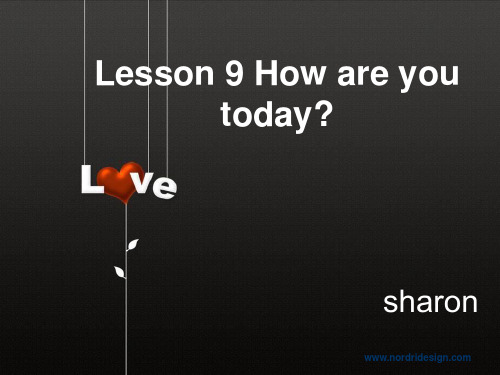
Key Points:
adj. 身体好的;健康的 adv. 好地;满意地;彻底地;充分地 int. (表示惊讶、同意)嗯;哎; e.g.: 他考试成绩很好。 He did very well in the exam. e.g.: 我和她不熟。 I don't know her well. e.g.: 医生说你过几天就会恢复健康。 The doctor says you will be well again in a few days. e.g.: Well, what a surprise! • well
woman [‘wumən] 女人
man [mæ n] 男人
pig [pig] 猪
fat [fæ t] 胖的
am [æ m] be动词,是 it [it] 它
he [hi:] 他
she [ʃi:] 她
is [iz] be动词,是
thin [θin] 瘦的
rabbit ['ræ bit] 兔子
• • • • • • • • • • 史蒂文:你好,海伦 海 伦:你好,史蒂文 史蒂文:你今天好吗? 海 伦:很好,谢谢你。你好吗? 史蒂文:很好,谢谢。 史蒂文:托尼好吗? 海 伦:他很好,谢谢。埃玛好吗? 史蒂文:她也很好,海伦。 史蒂文:再见,海伦。见到你真高兴。 海 伦:我见到你也很高兴,史蒂文。再见。
Key Points:
→ how soon (多长时间)以后;多快 e.g.: --- 飞机还有多久起飞? --- 20分钟后。 How soon will the plane take off? --- In 20 minutes. → how many (much) (数量)多少 → how about (doing sth.) (做某事)如何 e.g.: 这个周末购物怎么样? How about shopping this weekend? → how much (价格)多少 → how often (频率)多少 e.g.: How often do you brush your teeth? --- Twice a day.
(完整版)新概念第一册笔记整理
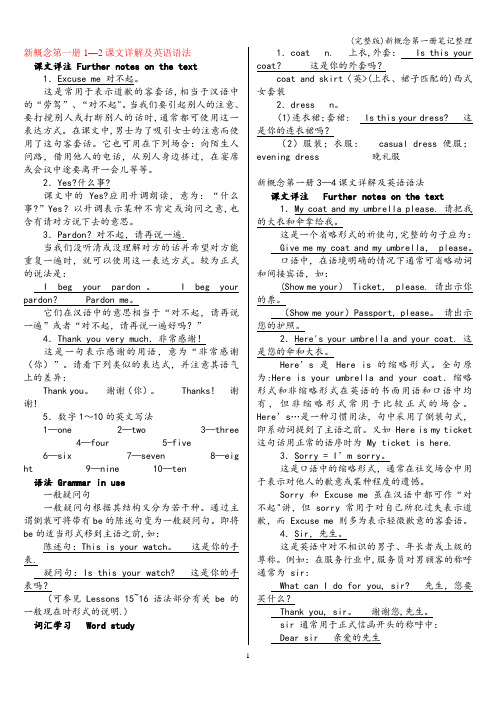
新概念第一册1—2课文详解及英语语法课文详注 Further notes on the text1.Excuse me 对不起。
这是常用于表示道歉的客套话,相当于汉语中的“劳驾”、“对不起"。
当我们要引起别人的注意、要打搅别人或打断别人的话时,通常都可使用这一表达方式。
在课文中,男士为了吸引女士的注意而使用了这句客套话。
它也可用在下列场合:向陌生人问路,借用他人的电话,从别人身边挤过,在宴席或会议中途要离开一会儿等等。
2.Yes?什么事?课文中的 Yes?应用升调朗读,意为:“什么事?”Yes?以升调表示某种不肯定或询问之意,也含有请对方说下去的意思。
3.Pardon?对不起,请再说一遍.当我们没听清或没理解对方的话并希望对方能重复一遍时,就可以使用这一表达方式。
较为正式的说法是:I beg your pardon。
I beg your pardon? Pardon me。
它们在汉语中的意思相当于“对不起,请再说一遍”或者“对不起,请再说一遍好吗?”4.Thank you very much.非常感谢!这是一句表示感谢的用语,意为“非常感谢(你)”。
请看下列类似的表达式,并注意其语气上的差异:Thank you。
谢谢(你)。
Thanks! 谢谢!5.数字1~10的英文写法1—one 2—two 3—three 4—four 5-five6—six 7—seven 8—eig ht 9—nine 10—ten语法 Grammar in use一般疑问句一般疑问句根据其结构又分为若干种。
通过主谓倒装可将带有be的陈述句变为一般疑问句。
即将be的适当形式移到主语之前,如:陈述句:This is your watch。
这是你的手表.疑问句:Is this your watch? 这是你的手表吗?(可参见 Lessons 15~16语法部分有关 be的一般现在时形式的说明.)词汇学习 Word study1.coat n. 上衣,外套: Is this your coat?这是你的外套吗?coat and skirt〈英>(上衣、裙子匹配的)西式女套装2.dress n。
新概念英语笔记-第一册(Lesson9-Lesson10)

新概念英语笔记(第一册)Lesson 9-10Content and Aim 内容和目标♦How引导的特殊疑问句♦单数代词加形容词的用法Key Words and Expressions 关键词和词组today 今天well 身体好fine 美好的thanks 谢谢see 见Language Points 语言点♦How are you today?1.英语中,朋友和相识的人之间见面时询问对方身体情况寒暄的话。
一般回答用Fine, thank you!/I’m fine, thank you!2.根据询问的人不同,使用的Be动词有所变化。
课文中用同样的句型,问候了对方的家人。
例如:How is he/Tony? –He’s fine, thanks./He’s very well, thanks.3.这个句子是how引导的一个特殊疑问句,How一般表示“怎样,怎么样”。
同样还有其他的问候方式,也用到how.例如:How are you doing today? (现在更流行用这个句子)注意:前面学习的How do you do这个句型是正式见面中的问候,而不是这里的“怎样”的意思,因此不能用语询问身体情况。
一定要注意区别!♦And you?=And how are you? 这是一种简略说法。
一般在上下文清楚的时候使用。
♦fine, well这两个形容词语,都是可以用于表示身体情况的。
什么是形容词?1.形容词可以用来表示某人,某物的特点,表示“是什么样、看上去怎么样”。
例如I’m fine/ I’m very well.2.形容词还可以用于直接修饰一个名词,直接放在名词前面,我们称之为“定语”He is a fat man.♦--- Goodbye, Helen. --- Nice to see you.1.表示“再见”的最常见说法就是Goodbye, 也可以只用”Bye”或”See you”2.Nice to see you=Nice to meet you1)首次见面时候的问候,同前面学习的“Nice to meet you”意思相同。
新概念英语第一册lesson9-10

New Words
tall 高的 young 年轻的 fat 肥胖的 Short 矮的 Old 老的 Thin 瘦的
New Words
hot 热的 busy 忙碌的 dirty 脏的
cold 冷的 lazy 懒得 clean 干净的
复习知识点: 人称代词
taxi driver n 出租汽车司机
air hostess 空中小姐
postman 邮递员
nurse 护士
mechanic 机械师
hairdresser 理发师
housewife 家庭主妇
milkman 送牛奶的人
句型练习
What is your job? 你是做什么工作的?
What nationality are you ? 你是哪个国家的?
How are you today ? I’m very well ,thank you .
And you ? I’m fine. Thanks.
How is Tony? He is fine .
How is Emma ? She is very well ,too.
Nice to see you , too, Steven .Goodbye .
Goodbye ,Helen . Nice to see you.
Translate the following into English
史蒂文:你好,海伦 海 伦: 你好,史蒂文 史蒂文:你今天好吗? 海 伦: 很好,谢谢你。你好吗? 史蒂文:很好,谢谢。 史蒂文:托尼好吗? 海 伦: 他很好,谢谢。埃玛好吗? 史蒂文:她也很好,海伦。 史蒂文:再见,海伦。见到你真高兴。 海 伦: 我见到你也很高兴,史蒂文。再见。
Lesson9-10Howareyoutoday(课件)新概念英语第一册
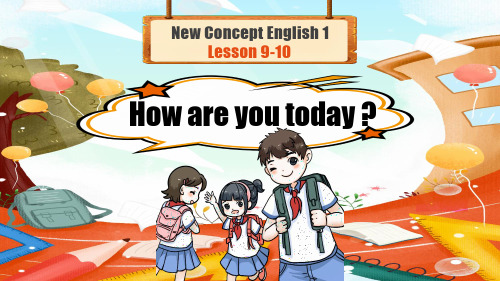
Read, look and choose. The housewife is lazy.
Read, look and choose. The milkman is ________ young old thin
Look and say.
The noun is ________ . a/an ________ noun
Say goodbye to Helen.
跟海伦说再见。
Look and say.
Look, listen and repeat.
Listen and spell.
see
Look and read.
see
见
Listen and repeat.
Nice to see you.
见到你真高兴。
Look and say.
see 看见
see
meet
sleep
hello
how
well
fine
goodbye
see
Fill in the blanks.
How
see
goodbye
hello
well fine
Say ______ to Helen. ____ are you today?
I’m very ____.
I’m ______. Say _________ to Helen. Nice to ____ you.
She is a ________ woman. fat thin tall
Read, look and choose. The man is hot.
Read, look and choose. The air hostess is young
新概念英语第一册Lesson9-10笔记(语法点+配套练习+答案)

1、单词分类;
int.
adv.
adj.
v.
hello
hi
thanks
goodbye
how
today
well
fine
see
2、课文复习
三、课文重点
重点
练习
look at sb. / sth.看(强调动作)
see sb. / sth.看到(强调结果)
__Look at___that dog!快看那条狗!
He isfine.对划线部分提问:How is he?
She isvery well.对划线部分提问:How is she?
3.与how有关的特殊疑问词
how old
多大(年纪)
how many
多少(可数)
how far
多远
how tall
多高
how much
多少(不可数)
how often
多久一次
4.句型转换
肯:The man isbusy.
否:The man is not busy.
一疑:Is the man busy?
答:Yes, he is. / No, he isn’t.
特:How is the man?
5.选择题
肯:The box isheavy.
否:The box is not heavy.
表语:用来描述主语状态或特征,名词或形容词可做表语
She is tall.
He is thin.
We are young.
It is happy.
The man is strong.
新概念一第 9-10课课件(完整版)

review
Review
1.词汇(职业) 2.特殊疑问句(What 引导的特殊疑问句) 3.人称物主代词(he-his she-her) 4.课文背诵
I
operator
am
keyboard
• 游戏流程:1、全体学生起立 2、Cindy展示单词或做动作 说反义词 3、全体学生抢读单词,最先读出来的学生先坐下 4、最后坐下学生所在的组不得分,另一组得分 •
1. hello [hə'ləu]
2. hi
[hai]
3. how
[hau]
4. today [tə'dei]
5. well [wel]
9. see
[si:]
int.喂(表示问候) int.喂,嗨 ad.怎样 ad.今天 a.身体好 a.美好的 int.谢谢 int.再见 v.见
fat [fæ t] a.胖的
thin [θin] a.瘦的
short [ʃɔ:t] a.矮的
tall [tɔ:l] a.高的
dirty ['də:ti] a.脏的
How are you? I'm fine./I'm very well,thanks.
用于对身体健康状况或某 种程度提问。意为:“… 怎么样?”
How is Emma?
How is Tony? He's fine,thanks.
She's very well.
How old are you?
多久(问频率) How old
short [ʃɔ:t] a.矮的
新概念英语第一册Lesson 9-10课件
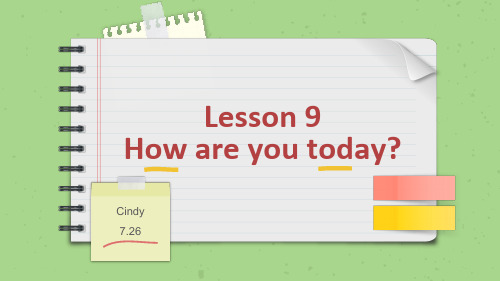
Q:How is Emma?
well [wel] adv. 好;对 adj. 健康;身体好 He cooks well.
do well in = be good at 擅长...
Get well soon! 愿早日康复!
fine [fain] adj. 美好的;健康的;好看的
3. The classroom is dirty. (变为同义句) The classroom is ____ _____. 4. Please ____ the picture. A. look B. look at C. see 5. How ___ you?
How ___ she? How ___ Linda? 回答:
如何回答how are you
I’m fine/well/great. Not too bad. Pretty good!
Couldn’t be better! Just so-so.
And you? = And how are you?
today 今天
yesterday 昨天 tomorrow 明天 the day before yesterday 前天 the day after tomorrow 后天
see [si:] v. 看见
see:强调看的结果 I can see a bus.
look at:强调看的目标 Look at me! Look at the time! We’ll be late.
watch:侧重于场面,强调观看的过程 watch TV watch a football game
1. 放在名词前修饰名词 a young nurse an old mechanic
新概念英语第一册第9-10课
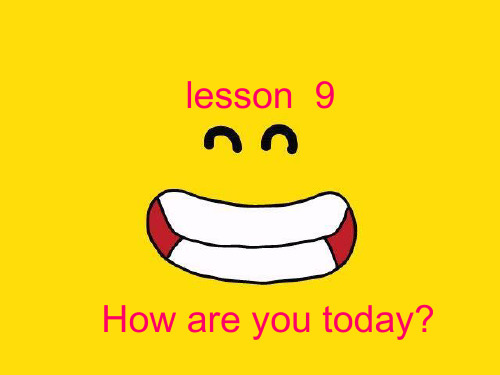
Part 3 Grammers
Look at...
Look at me. Kick the ball. Listen to me. Come in,please 祈使句:表命令,请求,建议的句子。 祈使句无主语 主语you省去ow are you?
1.问身体状况
Look at him. How is the man? The man is old. He is old.
Look at him. How is Xiao Wu? Xiao Wu is young. He is young.
Look at her. How is the air hostess? The air hostess is beautiful. She is beautiful.
Lesson 10 Look at……..
Look at him. How is Yao Ming? Yao Ming is tall.
He is tall.
Look at him.
How is Pan Changjiang?
Pan Changjiang is short. He is short.
lesson 9
How are you today?
加分机制
A
B
Part 1 Review
• 询问姓名
What's your/his/her name? 回答:My/His/Her name is.....
• 询问国籍
What nationality......? Where are you from? 回答:I'm+国籍人.
• 问职业
What's your job? What are you?/is she?/is he? 回答:I'm/She is/He is+职业.
新概念英语第一册101110课自学笔记很全很好
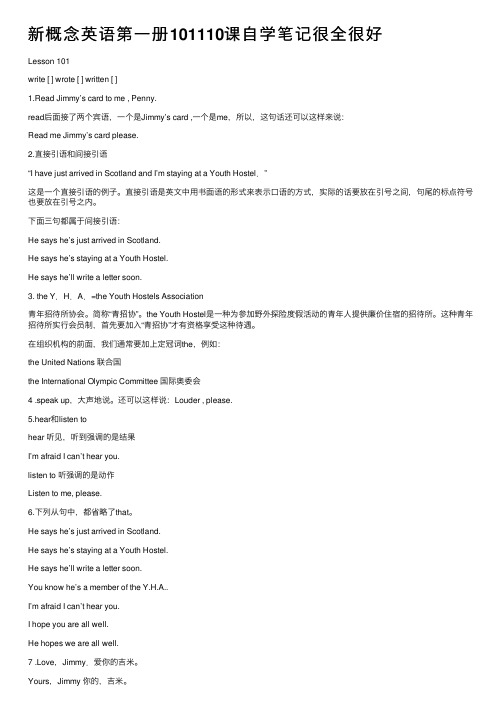
新概念英语第⼀册101110课⾃学笔记很全很好Lesson 101write [ ] wrote [ ] written [ ]1.Read Jimmy’s card to me , Penny.read后⾯接了两个宾语,⼀个是Jimmy’s card ,⼀个是me,所以,这句话还可以这样来说:Read me Jimmy’s card please.2.直接引语和间接引语“I have just arrived in Scotland and I’m staying at a Youth Hostel.”这是⼀个直接引语的例⼦。
直接引语是英⽂中⽤书⾯语的形式来表⽰⼝语的⽅式,实际的话要放在引号之间,句尾的标点符号也要放在引号之内。
下⾯三句都属于间接引语:He says he’s just arrived in Scotland.He says he’s staying at a Youth Hostel.He says he’ll write a letter soon.3. the Y.H.A.=the Youth Hostels Association青年招待所协会。
简称“青招协”。
the Youth Hostel是⼀种为参加野外探险度假活动的青年⼈提供廉价住宿的招待所。
这种青年招待所实⾏会员制,⾸先要加⼊“青招协”才有资格享受这种待遇。
在组织机构的前⾯,我们通常要加上定冠词the,例如:the United Nations 联合国the International Olympic Committee 国际奥委会4 .speak up,⼤声地说。
还可以这样说:Louder , please.5.hear和listen tohear 听见,听到强调的是结果I’m afraid I can’t hear you.listen to 听强调的是动作Listen to me, please.6.下列从句中,都省略了that。
- 1、下载文档前请自行甄别文档内容的完整性,平台不提供额外的编辑、内容补充、找答案等附加服务。
- 2、"仅部分预览"的文档,不可在线预览部分如存在完整性等问题,可反馈申请退款(可完整预览的文档不适用该条件!)。
- 3、如文档侵犯您的权益,请联系客服反馈,我们会尽快为您处理(人工客服工作时间:9:00-18:30)。
新概念英语课堂笔记第一册Lesson 9-10
Word Study
well
【用法】adj. 健康的;良好的
adv. 好地;满意地
【词组】be well 身体好
do well 做的好
【例句】I am very well. 我身体很好。
All is well with the family. 家中一切都好。
He did well in the exam. 他考试成绩很好。
fine
【用法】adj. 健康的;极好的;优秀的;晴朗的【例句】—How are you? 你好吗?
—I’m fine. Thank you. 很好,谢谢。
a fine view 美好的景色
a fine teacher 优秀的教师
a fine day 晴朗的天气
反义词
fat <反> thin 胖的—瘦的
thick <反> thin 厚的—薄的
tall <反> short 高的—矮的
long <反> short 长的—短的
dirty <反> clean 脏的—干净的hot <反> cold 热的—冷的
old <反> young 老的—年轻的busy <反> free 忙的—闲的
lazy <反> hard-working 懒的—努力的woman
【用法】n. 女人
【同义】female n./adj. 女人,女性的,雌性的【扩展】man n. 男人
male n./adj. 男人,男性的,雄性的Numbers
21—twenty-one 22—twenty-two
Text Explanation
How are you today?
【译文】你今天好吗?
【用法】这是一句寒暄用语,用于熟人之间的问候。
如问及对方的先生或太太的情况,可以说How is Tony? 或How is Emma? 等。
见下文。
I’m very well, thank you. And you?
【译文】很好,谢谢你。
你好吗?
【用法】I’m very well.是对How are you? 的一种回答。
回答时要根据自己的实际情况。
○1如果精神或生活很好,可以说:
Fine. / I’
m fine. / I’m (very) well. / Quite well. / Wonderful.
○2如果状态一般,可以说:
Not bad. / Just so so.
○3如果不太好,可以说:
Bad. / I am terrible.
And you? 是And how are you? 的简略说法,是礼貌性地回问对方的情况。
也可用What about you? / How about you?
Nice to see you.
【译文】见到你真高兴。
【用法】see v. 看见通常表示看的结果。
本句同Nice to meet you. 意思相同。
可互换使用。
meet v. 遇见往往指人与人的不期而遇。
Grammar Analysis
How引导的特殊疑问句
【介绍】how意为“如何,怎么样”,可引导特殊疑问句,也可和其他词构成特殊疑问词组引导特殊疑问句
【用法】how构成的疑问词组有:
How many …?多少?How much …? 多少?/ 多少钱?
How often …? 多久一次?How long …?多长时间?
How soon …? 多久以后?How far …? 多远?How old …? 多大了?
【例句】How is your mother? 你妈妈好吗?
How old are you? 你多大了?
How far is your school? 你学校多远?
形容词及其用法
【介绍】形容词用来修饰名词所指的人、物等。
我们用形容词说明人、物等是什么样或看上去是什么
样的。
例如,形容词可以表示质量、大小、新旧、温度、形状、颜色、产地。
译成汉语都带“的”字。
【用法】○1形容词通常放在名词前,作定语,用来修饰名词。
e.g. a young nurse 一位年轻的护士an old mechanic 一位老机械师
a lazy housewife 一个懒惰的家庭主妇 a thin woman 一个瘦瘦的女人
○2形容词还可以放在连系动词后面,作表语,用来说明主语的状态、特点等,构成主系表
结构。
be动词是连系动词的一种。
e.g. Tom is tall. 汤姆个子高。
(形容词tall作表语,说明主语Tom的特点。
)
I am tired. 我累了。
(形容词tired作表语,说明主语I的状态。
)
第 2 页。
